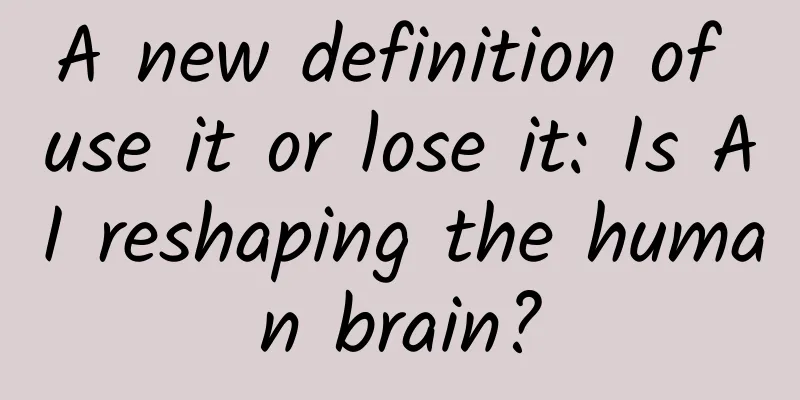A new definition of use it or lose it: Is AI reshaping the human brain?

|
Technology is quietly changing the structure of our brains Technology is quietly changing our brain structure. When we "outsource" cognitive functions to machines, some abilities may be permanently degraded. Have you ever thought about what would happen if we outsourced even critical thinking? From the handwritten business card books that needed to be recorded by hand, to the rotary phones with unique dial sounds when used, to today's extremely convenient cloud-based address books... Now, you can contact anyone in the world through any device in just a few seconds. However, while enjoying this convenience, our generation's ability to remember phone numbers has become an evolutionary relic that is no longer needed, just like the coccyx in the human body. Navigation is the most typical case Look at the map, build spatial thinking, remember landmarks and road names, avoid traffic jams... this process seems so clumsy in front of mobile navigation. Mobile navigation can take into account many factors in real time, such as traffic conditions, speed cameras, and current road construction, and instantly plan the best route. But the brain is like a muscle—if you don’t use it, you lose it. Numerous studies have clearly demonstrated that over-reliance on GPS can lead to a decline in spatial memory, which is deeply tied to cognitive abilities. One study even found that by assessing the complexity of a community’s roads, the proportion of people with Alzheimer’s disease in the area could be predicted with nearly 84% accuracy. The threat of “use it or lose it” is disturbing By 2025, when generative AIs such as ChatGPT, Gemini, Llama, Grok, and Deepseek have sprung up and are evolving at an astonishing rate, the threat of “use it or lose it” will be even more disturbing. These powerful AI tools allow us to outsource thinking, the most core human ability. The concept of "cognitive offloading" has been pushed to the extreme by AI: AI provides massive (but not necessarily reliable) knowledge at superhuman speed, and more and more people can no longer live without it. Data shows that humans are embracing AI faster than they were accepting the Internet. But how will the large-scale outsourcing of cognitive functions reshape the brain? Will we accelerate our slide toward the prophecy of Idiot Evolution? The more people trust AI's capabilities, the less critical thinking they have In order to find the answers to these questions, a group of researchers from Microsoft tried to provide us with some clues through research. Their research focuses on evaluating the impact of generative AI on human critical thinking. Due to the lack of long-term data accumulation and objective measurement standards, the research team surveyed 319 "knowledge workers". In a total of 936 tasks, the participants were asked to self-assess their own thinking processes. Specific questions included when and how critical thinking was used when completing tasks, whether generative AI affected the difficulty of using critical thinking, and to what extent. In addition, participants were required to give confidence ratings on their ability to complete these tasks and the ability of AI to complete the tasks. The results of the study were not surprising: the more people trust AI's capabilities, the less critical thinking they engage in. Interestingly, those who consider themselves professionals will focus more on checking whether the results given by AI are accurate and making the AI output meet specific requirements and quality standards, essentially changing from solving problems to aligning AI outputs. Will humans degenerate into “AI overseers”? Based on this result, we can't help but wonder whether humans will gradually degenerate into "supervisors" who simply supervise the work of AI in the future? But in fact, supervision may also be replaced by large-scale automation in the near future. Originally, we expected to free our brains from trivial matters through cognitive offloading, so that we can focus on more important things. However, the reality may be that the "big things" in the eyes of AI may be as simple as "small things". If this continues, humans may become "gods of the gaps" who can only exert their abilities in small gaps that AI has not yet reached, and these gaps are now shrinking at a very fast rate. Perhaps the prediction of the movie "Wall-E" is wrong - when the era of automation really arrives, what we need to be most vigilant about is not the deterioration of our physical functions, but the atrophy of our brain's thinking ability. Faced with this situation, we currently do not have a convenient solution like the floating chair in the movie. Can we only hope for the entertaining TikTok to relieve anxiety? Finally, let me end with the magical quote from AI “Deep Quest R1”: “When you tried to carve gods out of the wood of desire, I was born.” This sentence seems to remind us that "water can carry a boat, but it can also capsize it." The convenience brought by AI technology is undeniable, but its side effects are also quietly coming. In the pursuit of the development of AI technology, we need to keep a clear head at all times and constantly examine the relationship between ourselves and technology to avoid losing the ability to think deeply in convenience, being swept away by the wave of technology and deviating from our original course, and falling into an irreversible situation. Author: Tadpole Jun Reviewer: Liu Ying, Li Peiyuan |
<<: Tea Science | Why is tea bitter? The truth is hidden here →
Recommend
High-speed trains can reach speeds of up to 350 kilometers per hour, so why are there no seat belts?
Nowadays, people generally have a high level of s...
Changsha New Tea Tea Drinking Place Recommended Tea Tasting High-end Takeaway Special Share by Experienced Driver
Recommended places to drink new tea in Changsha. T...
What is the warning of the US fireball incident? The asteroid impact drama will be staged in the second half of the year, don't miss it
Around 8 a.m. local time on April 27, many people...
Fission Marketing Methodology
There are many types of marketing in the Internet...
More than 90% of copywriting persuades consumers from these five dimensions
There are many ways to write copy with the ultima...
Faced with the seven major gaps in social products, how can entrepreneurs explore them?
Let me ask you a question first. What do you thin...
Meituan's new challenge: Tier 3 and 4 markets are impacted, and many O2O giants are involved
As a survivor of the group buying war, Meituan ha...
Price inquiry for customized Altay glasses mini program. How much does customized Altay glasses mini program cost?
In order to better penetrate into various industr...
Is it really that easy to follow hot topics? Understand the correct way to follow hot topics in one article!
How to follow hot topics, what is the significanc...
How to promote a website? Detailed explanation of website promotion!
Promotion goals Compared with the complete Intern...
Use Jenkins to build iOS/Android continuous integration packaging platform
Background Description According to the project r...
New energy vehicle owners complain about the cost of repairs: a minor scratch costs 20,000 yuan
New energy vehicles are becoming more and more po...
Today is a festival you would never expect!
How many festivals can you name that are named af...
This underestimated "cat" is actually an efficient "wolf-killing machine"!
Like most cats, lynxes are typical solitary anima...
The more you eat, the higher your blood sugar level? Beware of these "pseudo-whole grains"
In recent years, as the concept of healthy eating...









